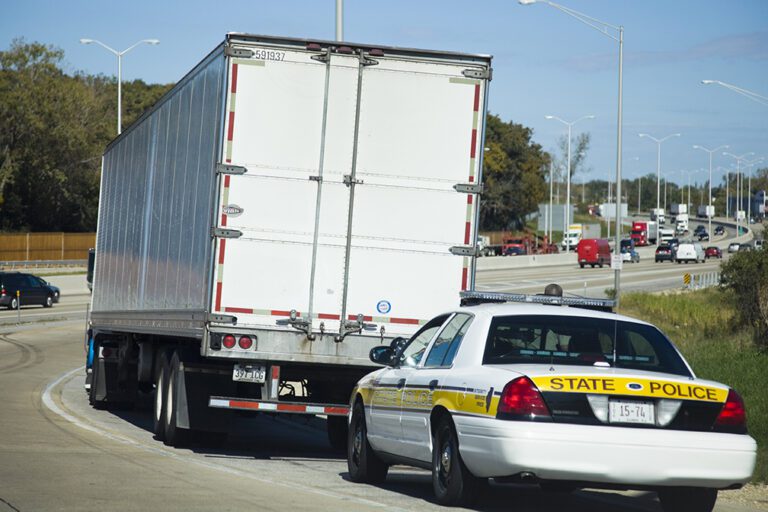As a lawyer who defends professional drivers on traffic citations, one of the most frequently asked questions I receive is, “What should I do during a traffic stop?” With that in mind, I’ll do my best to answer that question today. In my traditional style, my response may ramble a bit — but it’s the truth!
The most common involvement with law enforcement is a basic traffic stop. You see the flashing lights and pull to the side of the road. Now what? How do you best handle this situation to protect yourself?
Well, let’s start with the basics. First, it is extremely important that you remain calm and professional, and that you treat the officer with respect. This is critically important. I cannot stress this enough! You will never win any arguments roadside with an officer who is wearing a badge and carrying a gun. Choosing to argue will only ensure you a citation — and a possible stay in the local jail.
To use a sports analogy: Have you ever seen an umpire or referee reverse their decision based on protests by a player or manager? If you have, please let me know when and where. Instead, what happens is the decision remains, and the player or manager runs the risk of being ejected. In the trucking world, that means you’re now running the risk of spending the night as a guest of the city or county. Not to mention, the officer will note on that citation not only your words, but also your attitude. This can have a detrimental impact on the outcome of your citation.
Also, remember that a traffic ticket is nothing until it becomes a conviction. It becomes a conviction when you automatically pay the fine, fail to show up for court on the appointed day, or the judge or jury hears all the evidence and decides you’re guilty. All have the same effect as a conviction, and all will show up on your MVR (motor vehicle record). Never just pay a ticket and admit guilt if you believe you’ve done nothing wrong. Your court hearing is an opportunity to explain your side of the story and present evidence showing the citation is in error. Making these arguments roadside will only fall on deaf ears.
In addition, when talking to the officer who approaches your truck, keep your hands visible. If it’s nighttime, turn on the light in your cab. Do what you can to put enforcement officers at ease, because they’ll be uneasy and unsure about what they might encounter. The more agreeable you are, the better the roadside interaction will go.
Above all else when in a traffic stop situation, don’t convict yourself. Be careful of the words you choose and the information you provide. It’s best to answer any questions directly — but never volunteer information lest you incriminate yourself. The officer will note everything you say if you admit guilt.
An example I hear all the time is this: A driver gets pulled over. When asked if they know why they were stopped, the response is something like, ‘I was probably going about 70 mph.’ Or, they’ll say they were doing “just a little” over the limit, say 60 mph in a 55 mph zone. Both are an admission of speeding. The cop asks a simple question, and drivers convicts themselves with the answer. Instead, simply say no — or ask the officer how fast they thought you were going, or admit you are unsure of your speed at the time in question. Refrain from agreeing with whatever they say — but do so respectively.
In the event the officer asks if you will consent to a search, my general advice is to say no. Of course, if you’re absolutely positive there’s nothing to find, you can do as you wish. Remember, of course, that if an officer really wants to search your vehicle, they’ll find a way to get it done. They may say they detect the smell of marijuana, or bring out a K9 unit that might “hit” on your truck. But, at the end of the day, if you don’t consent to a search and one is conducted, and something discovered, you can argue the legality of the search at your hearing. If you consent, any arguments you may have will go out the window.
Another thing you can do is make a video recording of the stop (as long as you’re in a place it’s legally allowed to record the stop). The officer may be doing the same through a dash or collar cam. Keep in mind that recording the stop may not endear you to the officer.
After the stop is over, one of the best things you can do is record, either as a voice message on your phone or as written note, everything that happened before, during and after the stop. You can use this information later to refresh your memory if you’re a witness on the stand. The judicial system understands that data recorded at the time of the incident is more accurate than your memory some three to 12 months later. This makes your written or recorded information more accurate in the court’s mind than that of an officer who makes 25 traffic stops a day and has to recall your specific incident specifically at a later date.
In the March edition of The Trucker, I’ll discuss what to do in case of an accident and provide additional tips to make any roadside interactions with law enforcement go more smoothly.
Brad Klepper is president of Interstate Trucker Ltd. and is also president of Driver’s Legal Plan, which allows member drivers access to services at discounted rates. For more information, contact him at 800-333-DRIVE (3748) or interstatetrucker.com and driverslegalplan.com.
Brad Klepper is a regular contributor to The Trucker, providing valuable insights for drivers and motor carriers. He serves as president of Drivers Legal Plan, a national law firm offering discounted CDL ticket defense to members, and Interstate Trucker, a law firm providing CDL defense with no monthly fees.









This article provides invaluable advice for professional drivers on how to handle traffic stops effectively and professionally. Emphasizing the importance of remaining calm, respectful, and cautious during interactions with law enforcement can significantly impact the outcome of a traffic stop. The tips on avoiding self-incrimination, recording details, and understanding one’s rights are particularly useful. A must-read for drivers looking to navigate traffic stops with confidence and protect their driving records!